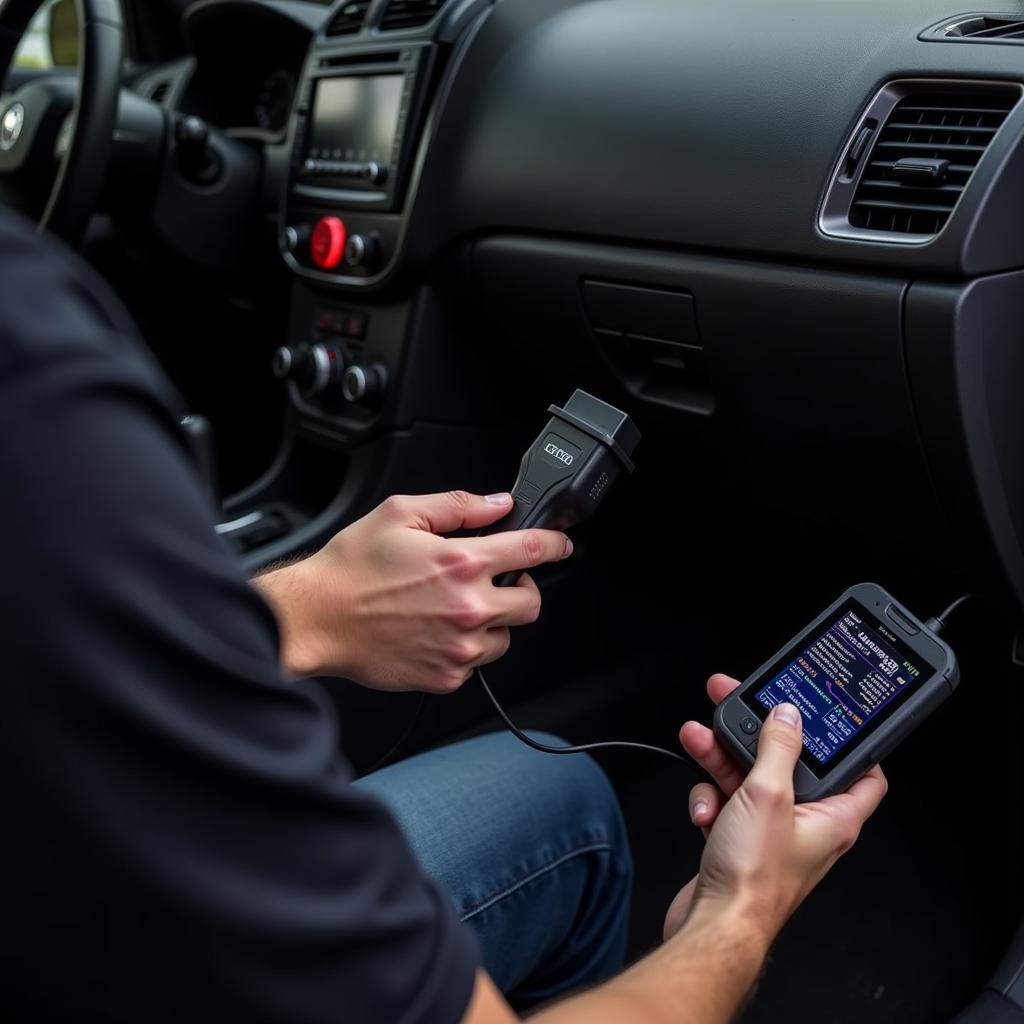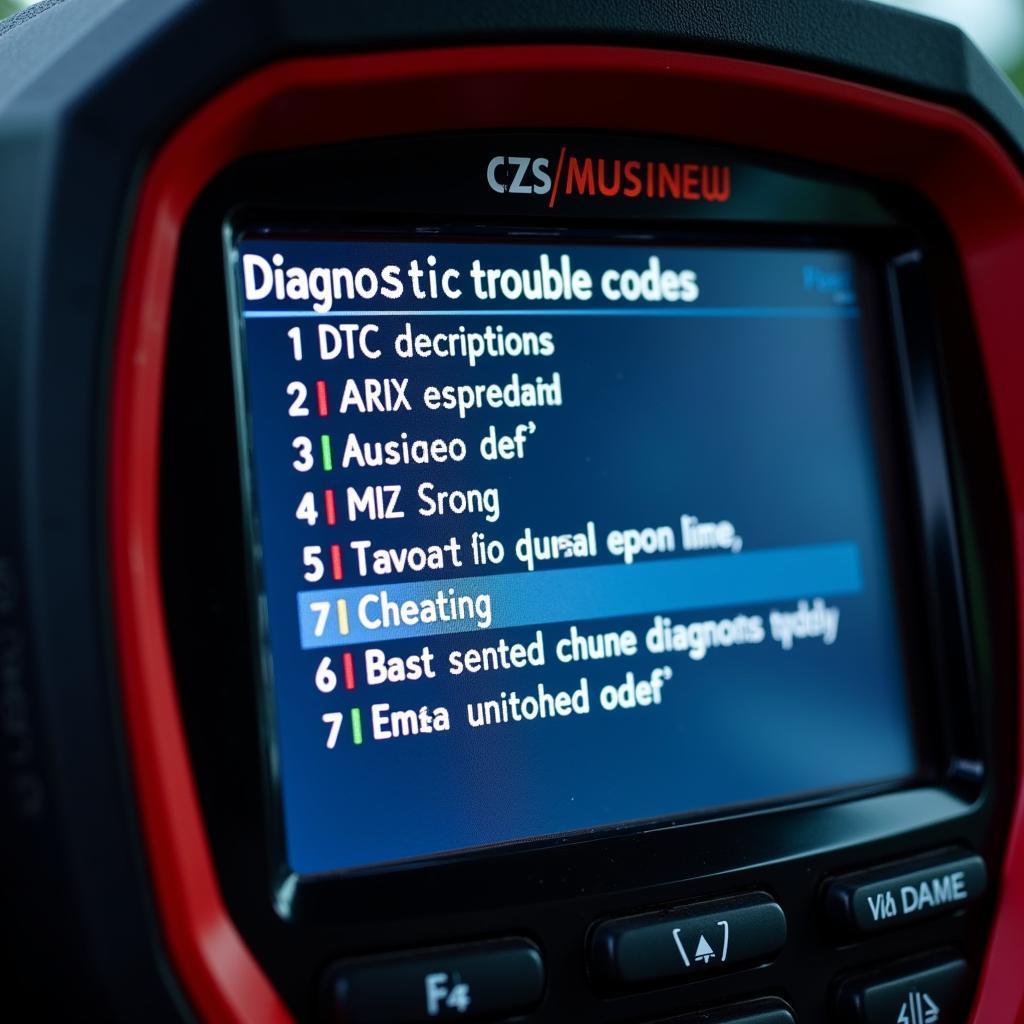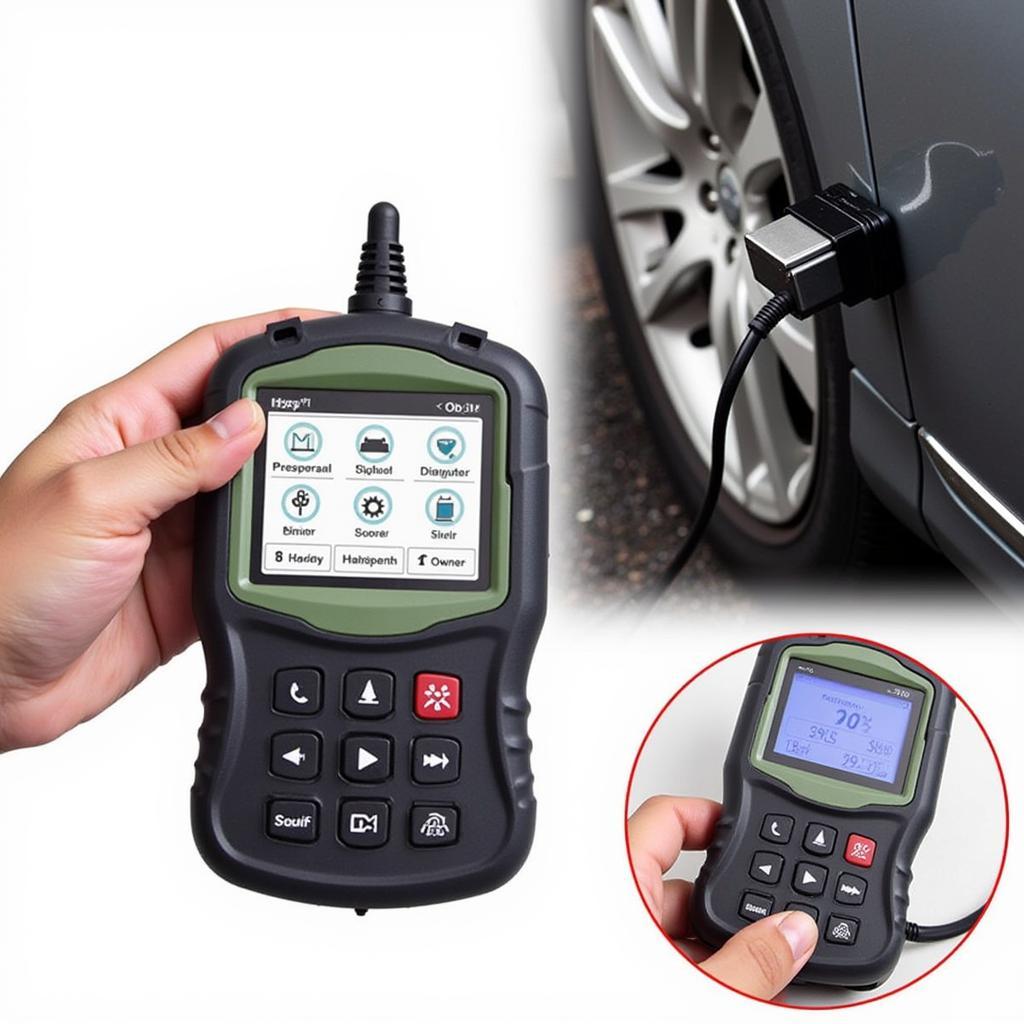A car diagnostic test is an electronic inspection of your vehicle’s computer system. It’s like giving your car a health checkup at the doctor’s office, but instead of a stethoscope, it uses a specialized tool called a car diagnostic scanner. This scanner connects to your car’s onboard computer, reading and interpreting data from various sensors and systems within the vehicle.
 Car Diagnostic Test in Progress
Car Diagnostic Test in Progress
Why Are Car Diagnostic Tests Important?
Car diagnostic tests play a crucial role in modern car maintenance and repair. They help identify potential issues early on, saving you time, money, and potential headaches down the road. Here are some key reasons why car diagnostic tests are essential:
- Early Problem Detection: They can detect issues before they become major problems, sometimes even before you notice any symptoms. This allows for timely repairs and prevents further damage to your vehicle.
- Accurate Diagnosis: Diagnostic tests provide specific information about the problem, pinpointing the faulty sensor, system, or component. This eliminates guesswork and ensures the right repairs are made.
- Cost Savings: By accurately diagnosing problems, you can avoid unnecessary repairs and replacements, saving you money in the long run.
- Improved Safety: Identifying and addressing issues early on contributes to a safer driving experience by preventing breakdowns and malfunctions.
What Does a Car Diagnostic Test Tell You?
Think of your car’s computer system as a central hub receiving information from various sensors throughout the vehicle. These sensors monitor everything from engine performance and emissions to airbag systems and anti-lock brakes. A car diagnostic test taps into this data, providing insights into a wide range of areas, including:
- Engine Performance: Issues like misfires, fuel/air mixture problems, and compression issues.
- Transmission Problems: Slipping gears, rough shifting, and other transmission-related concerns.
- Emissions System: Problems with the catalytic converter, oxygen sensors, and other emissions-related components.
- Brake System: Issues with the ABS (Anti-lock Braking System), traction control, and other brake components.
- Airbag System: Malfunctions within the airbag control unit or sensors.
 Car Diagnostic Scanner Display
Car Diagnostic Scanner Display
Understanding Diagnostic Trouble Codes (DTCs)
During a car diagnostic test, the scanner retrieves Diagnostic Trouble Codes (DTCs). These codes are standardized alphanumeric codes that represent specific problems detected within the vehicle’s systems.
For example, a code like “P0301” indicates a misfire detected in cylinder number one. Mechanics use these codes, along with their knowledge and experience, to determine the root cause of the problem and recommend the necessary repairs.
Where Can I Get a Car Diagnostic Test?
You have several options for getting a car diagnostic test:
- Mechanic Shops: Most reputable mechanic shops offer diagnostic testing services.
- Dealerships: Dealerships have specialized equipment and technicians trained specifically for your car’s make and model.
- Auto Parts Stores: Some auto parts stores offer free or low-cost diagnostic tests.
If you’re unsure about the cost or are looking for affordable options, be sure to inquire about “how much should car diagnostic cost” or “how much does a full car diagnostic cost” when contacting different service providers. Knowing the typical price range in your area can help you make informed decisions and avoid overpaying for this essential service.
“Regular car diagnostic tests are an essential part of preventative maintenance,” says John Smith, a senior mechanic with over 20 years of experience. “Early detection can save car owners significant money and hassle in the long run.”
DIY Car Diagnostic Tools
In recent years, DIY car diagnostic tools have become increasingly popular among car enthusiasts and those looking for a more hands-on approach. These handheld scanners connect to your car’s OBD-II port, just like the ones professionals use, but they are more affordable and user-friendly.
 DIY Car Diagnostic Tool
DIY Car Diagnostic Tool
While DIY tools can be helpful for reading and understanding basic diagnostic trouble codes, it’s important to note that they may not provide the same level of detail or diagnostic capabilities as professional-grade equipment.
If you’re facing complex car problems or are unsure about interpreting the results, it’s always best to consult with a qualified mechanic. Additionally, if you’re based in the UK and experiencing issues with your diagnostic tool, you might find our article “what’s wrong with my car diagnostic tool uk” helpful in troubleshooting common problems.
When Should You Get a Diagnostic Test?
It’s a good idea to get a car diagnostic test in the following situations:
- Warning Lights: If any warning lights illuminate on your dashboard, such as the “Check Engine” light.
- Performance Issues: If you notice any unusual noises, vibrations, or changes in your car’s performance.
- After an Accident: To check for any hidden damage or electronic malfunctions.
- Before Buying a Used Car: To ensure there are no underlying mechanical issues.
Conclusion
A car diagnostic test is an invaluable tool for maintaining your vehicle’s health, performance, and safety. By providing detailed insights into your car’s systems, it enables accurate diagnosis, timely repairs, and ultimately, peace of mind on the road. Whether you choose a professional service or opt for a DIY approach, understanding the importance of car diagnostic tests can help you keep your car running smoothly for miles to come.
FAQs about Car Diagnostic Tests
1. How long does a car diagnostic test take?
A basic car diagnostic test usually takes about 30 minutes to an hour. However, the time can vary depending on the complexity of the issue and if further inspection is required.
2. Can I drive my car with the Check Engine light on?
While it’s generally possible to drive a short distance with the Check Engine light on, it’s essential to get your car diagnosed as soon as possible to prevent potential damage or safety hazards.
3. Will a car diagnostic test drain my car battery?
No, a car diagnostic test uses very little power and will not drain your car battery.
4. Do I need to take my car to a dealership for a diagnostic test?
While dealerships have specialized equipment and knowledge, reputable independent mechanic shops can also perform accurate car diagnostic tests.
5. How often should I get a car diagnostic test?
It’s a good practice to get a car diagnostic test annually, or more frequently if you notice any unusual symptoms or warning lights.
6. Can a car diagnostic test tell me everything that’s wrong with my car?
While car diagnostic tests are highly effective, they may not detect every possible issue. Sometimes, further inspection and testing may be required.
7. What if my car diagnostic test doesn’t reveal any problems?
If your car is experiencing issues, but the diagnostic test shows no codes, it doesn’t mean there isn’t a problem. It could be an intermittent issue or a problem not detectable by the scanner. It’s best to consult with a trusted mechanic for further diagnosis.
Exploring Further Car Diagnostic Information
If you’re interested in learning more about car diagnostic costs or finding affordable options in your area, check out our articles:
- “[How much for car diagnostic test](https://diagfixpro.com/how much-for-car-diagnostic-test/)”
- “Where can i get my car diagnostic done“
We are here to assist you with any car diagnostic questions or concerns you may have. Feel free to reach out to our expert team via WhatsApp at +1(641)206-8880 or email us at [email protected]. We offer 24/7 customer support to ensure your needs are met promptly.

Leave a Reply